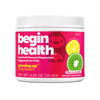What Does Potassium Do for Kids?
share this article

Why Potassium Matters for Growing Bodies
Potassium is an essential mineral and electrolyte that plays a big role in helping your kid’s body grow, move, and function properly. It may not get as much attention as calcium or iron, but potassium is just as important especially for muscle function, nerve signaling, hydration, and heart health.
Many kids, however, don’t get enough potassium each day. In fact, it’s considered a “nutrient of concern” in the U.S. because of how often it's lacking in the standard diet [1]. Low potassium can contribute to issues like fatigue, constipation, and even high blood pressure over time.
Let’s break down exactly what potassium does and how to make sure your kiddo is getting enough.
5 Key Things Potassium Does for Kids
1. Supports Muscle Movement and Strength
Potassium helps regulate muscle contractions and prevents cramping. Kids who are active or going through growth spurts need steady potassium levels to help their muscles move properly and recover after activity.
2. Keeps the Heart Beating Steadily
As an electrolyte, potassium helps control the electrical activity of the heart. It works with sodium to maintain a healthy heart rhythm and blood pressure. Imbalances, especially too little potassium can cause fatigue or irregular heartbeats.
3. Helps with Nerve Function and Brain Signaling
Potassium is essential for the communication between nerves and muscles. It helps nerve cells send messages to the brain and body, supporting reflexes, learning, and motor coordination.
4. Maintains Healthy Digestion and Hydration
Potassium helps manage fluid balance and supports gut motility. Low potassium can contribute to constipation.
5. Balances Sodium in the Diet
Most kids eat too much sodium and not enough potassium. These two nutrients work together to regulate blood pressure and fluid levels. Higher potassium intake can help offset the effects of a salty, processed diet.
How Much Potassium Do Kids Need?
The recommended daily intakes (Adequate Intake levels) for potassium are:
|
Age |
Potassium (mg/day) |
|
1–3 years |
2,000 mg |
|
4–8 years |
2,300 mg |
|
9–13 years |
2,500–2,300 mg |
|
14–18 years |
2,300–3,000 mg |
Many kids fall short because potassium-rich foods like fruits, veggies, and legumes are often under-consumed. [2]
Top Kid-Friendly Potassium Foods
-
Bananas
-
Potatoes (white and sweet)
-
Avocados
-
Yogurt
-
Spinach
-
Beans and lentils
-
Oranges and orange juice
-
Watermelon
-
Coconut water
Tip: Offering potassium-rich foods alongside meals or in smoothies can help boost intake without added stress.
Summary
Potassium is essential for kids' muscle strength, nerve function, digestion, and heart health yet many kids don’t get enough. Focus on adding more potassium-rich whole foods to your child’s diet, and talk to your pediatrician if you're considering supplements. A healthy balance of potassium and other electrolytes supports energy, hydration, and a happy gut.
















